English Words in Action, Group R
(a variety of English words which have developed through history and are currently used in our modern age)
Simply click on this banner (or the following link) and you will be on your way to stimulate your brain for greater word comprehension with quizzes based on some of the words in this unit.
riot (verb), riots; rioted; rioting
To protest violently about something or raising an uproar by being violent: The rebels rioted in the capital city and other towns against the head of the government.
1. The possibility of suffering harm or loss; the danger that injury, damage, or loss will occur; jeopardy: There is a risk anytime a person plans to drive a car when the gas level is low.
2. A factor, thing, element, or any course of action involving uncertain damage or loss; a hazard: There is a considerable risk caused by freezing rain for people who are walking outside.
3. The statistical chance that there could be danger from something; especially, from the failure of an engineered system: A poorly constructed bridge is a significant risk for the drivers in the city.
4. Etymology: from the 1660's risque, from French risque, from Italian risco, riscio, the modern version is now rischio, from riscare, "to run into danger"; of uncertain origin.
2. A factor, thing, element, or any course of action involving uncertain damage or loss; a hazard: There is a considerable risk caused by freezing rain for people who are walking outside.
3. The statistical chance that there could be danger from something; especially, from the failure of an engineered system: A poorly constructed bridge is a significant risk for the drivers in the city.
4. Etymology: from the 1660's risque, from French risque, from Italian risco, riscio, the modern version is now rischio, from riscare, "to run into danger"; of uncertain origin.
risk (verb), risks; risked; risking
1. To expose a person or something to harm, danger, or loss; or to have a situation in which it could be lost or damaged: Steve's father risked all of his money by starting his own business; especially, in these bad economic times.
2. To make it possible that something harmful, dangerous, or detrimental could happen: David's company is risking the loss of millions of dollars by taking part in the proposed project.
2. To make it possible that something harmful, dangerous, or detrimental could happen: David's company is risking the loss of millions of dollars by taking part in the proposed project.
Something that makes a person more likely to get a particular disease or some other undesirable physical condition: Old age is one of the risk factors for fracturing bones; among other problems.
A situation involving a potentially negative result: Anthony rejected stocks that didn't pay dividends because of their riskiness in maintaining their value over the years.
Someone who does something which involves danger or an unpredictable result in order to succeed with an unsafe task: When Brandon was asked if he would climb up on the roof to fix a leak during a rain storm, he said, "No way. I'm not a risk-taker; especially, not during this rainstorm!"
The act or fact of doing something which involves some danger or risk in order to achieve a goal or purpose: If a person starts a business, it always involves some risk-taking.
risky (adjective), riskier, riskiest
Descriptive terms that indicate the possibility of something bad or unpleasant happening: This agricultural investment is not as risky as some people think because it probably will supply food products that are currently in short supply.
It's riskier to increase wages at this time because it could result in a loss of finances and then the riskiest part would be a loss of jobs.
roguish (adjective), more roguish, most roguish
1. Characterizing a person who is dishonest, unprincipled, or unscrupulous: The criminal in the story was presented as being quite roguish because he told the lovely lady that she was beautiful and at the same time stole her expensive bracelet!
2. Descriptive of the manner or expression which is pleasantly or playfully mischievous in an appealing bold way: At the party Jim gave Susan a roguish smile which made her blush completely!
3. Etymology: from Latin rogare, "to be dishonest, to be rascally."
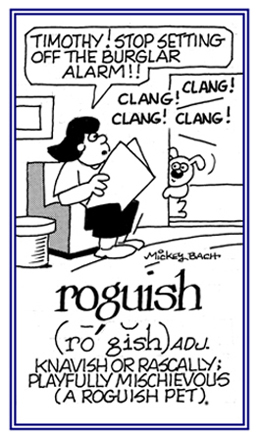
© ALL rights are reserved.
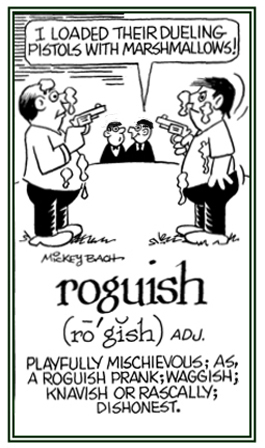
© ALL rights are reserved.
Go to this Word A Day Revisited Index
2. Descriptive of the manner or expression which is pleasantly or playfully mischievous in an appealing bold way: At the party Jim gave Susan a roguish smile which made her blush completely!
3. Etymology: from Latin rogare, "to be dishonest, to be rascally."


Go to this Word A Day Revisited Index
so you can see more of Mickey Bach's cartoons.
roil (ROIL) (verb), roils; roiled; roiling
1. To irritate; to ruffle the temper, or to arouse the resentment of; to vex,; to rile: The governor was roiled by the obvious lies that were being told about his family.
2. Etymology: from French rouiller, "to make muddy". The first definition of the English word given in the major dictionaries; therefore, is that of making water or wine cloudy or opaque; as the water was roiled by the ship's propellers.

© ALL rights are reserved.
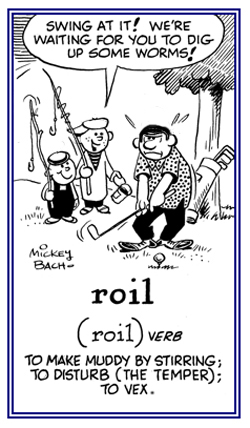
© ALL rights are reserved.
Go to this Word A Day Revisited Index
2. Etymology: from French rouiller, "to make muddy". The first definition of the English word given in the major dictionaries; therefore, is that of making water or wine cloudy or opaque; as the water was roiled by the ship's propellers.


Go to this Word A Day Revisited Index
so you can see more of Mickey Bach's cartoons.
A noisy commotion or disturbance: The science teacher caused a ruckus among some parents when he presented his thoughts about the evolution of mankind.
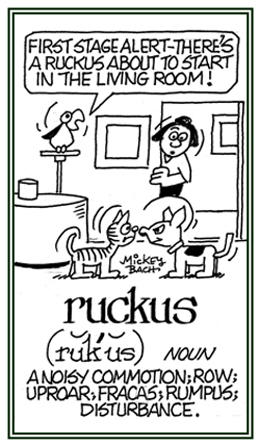
© ALL rights are reserved.
Go to this Word A Day Revisited Index
Lenora was suddenly awakened by the noise caused by the ruckus of fighting cats near her bedroom window.

Go to this Word A Day Revisited Index
so you can see more of Mickey Bach's cartoons.
rue (verb), rues; rued; ruing
1. To feel sorrow or regret for doing something: Jake said he rued the day that he bought his car because it kept breaking down so often.
2. Etymology or origin: from Middle English ruen, "sorrow, regret."
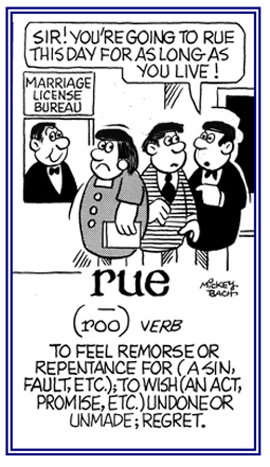
© ALL rights are reserved.
Go to this Word A Day Revisited Index
2. Etymology or origin: from Middle English ruen, "sorrow, regret."

Go to this Word A Day Revisited Index
so you can see more of Mickey Bach's cartoons.
rueful (adjective), more rueful, most rueful
1. Relating to a person's feeling or to an expression of regret: Little Jeremy gave his mother a rueful smile when he apologized for spilling some soup on the table during lunch.
2. Conveying sympathy or compassion: Jack nodded his head at Rebecca's reason for being late with dinner and so, he gave her a rueful and understanding smile.
3. Etymology or origin of the word: from Old English hreow, "repentance" and German Reue, "remorse."
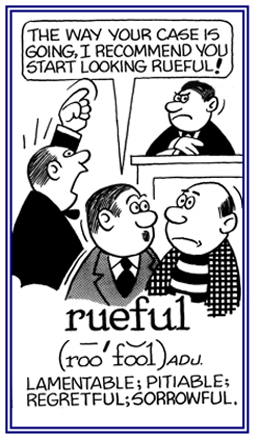
© ALL rights are reserved.
Go to this Word A Day Revisited Index
2. Conveying sympathy or compassion: Jack nodded his head at Rebecca's reason for being late with dinner and so, he gave her a rueful and understanding smile.
3. Etymology or origin of the word: from Old English hreow, "repentance" and German Reue, "remorse."

Go to this Word A Day Revisited Index
so you can see more of Mickey Bach's cartoons.
1. A low, heavy sound or a series of sounds: The rumbles of the train passing by woke Ernest and his family up in the middle of the night.
2. An informal U.S. term referring to a fight in the street; especially, between gangs: The guys in the rumble last night not only created fear among the neighbors, but it also resulted in property damage.
2. An informal U.S. term referring to a fight in the street; especially, between gangs: The guys in the rumble last night not only created fear among the neighbors, but it also resulted in property damage.
rumble (verb), rumbles; rumbled; rumbling
1. To make a low heavy, continuous sound or series of sounds: Polly and Todd could hear the thunder which was rumbling in the distance before the rain started to fall.
2. To move along with a low, heavy continuous sound: The trains rumble through town at least twice every day.
3. To fight; especially, in the street: The gangs were rumbling in the alley earlier today.
4. To continue for a long time: The political debate rumbled on for days during the TV news and special radio and TV discussions.
2. To move along with a low, heavy continuous sound: The trains rumble through town at least twice every day.
3. To fight; especially, in the street: The gangs were rumbling in the alley earlier today.
4. To continue for a long time: The political debate rumbled on for days during the TV news and special radio and TV discussions.
Links to all of the groups of English words in action, Groups A to Z.
You may see the bibliographic list of sources of information for these words in action.


